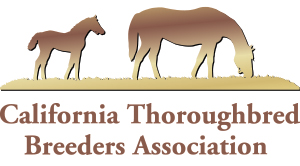By Jay Hovdey, DRF.com
An expert in statistical theory and application would suggest that if something has not happened in 51 years, it is unlikely to happen in the 52nd. Such an expert also would recommend against playing cards with a guy named Ace or betting on the Vikings in the Super Bowl. Any Super Bowl.
Those who are prepared to follow California Chrome over the cliff of passionate favoritism in the 140th Kentucky Derby two weeks from now would be wise to keep that number – 51 – in mind, because the last time a racehorse who was born and raised in the Golden State won the Derby was in 1962, when a Catholic was president, Cuba had missiles, and gasoline was 25 cents a gallon.
[ROAD TO THE KENTUCKY DERBY: Prep races, point standings, replays]
This is not to say it matters squat to the Thoroughbred in question where he was born. It wasn’t as if California Chrome staggered to his wobbly legs on the 18th of February, three years ago, caught a glimpse of the license plate on the veterinarian’s truck, and muttered, “Aw, nuts, there goes the flippin’ Derby.”
Still, there is no disputing that there have been 51 Kentucky Derby winners since 1962, and not one of them had his or her roots in California. There was one from Illinois, one from Maryland, one from New York (New York?), two from Pennsylvania, three from Virginia, four from Florida, and two – believe it or not – from Canada. The rest have been from Kentucky. Even the Derby winner from Venezuela was originally from Kentucky.
The question, therefore, is begged: What’s wrong with California-breds? Is it the water? The air? The traffic? Are gestating mares negatively impacted by seismic rumblings? Too much patchouli in the sweet feed?
If California can breed a horse like Tiznow to win back-to-back runnings of the Breeders’ Cup Classic, then it ought to be able to churn out at least a couple of Derby winners by accident. Granted, the three lonely Derby winners from California were choice. Morvich went into the 1922 Kentucky Derby 11-0 and came out of it 12-0. Swaps beat Nashua in 1955 and was Horse of the Year in 1956. Decidedly, the hero of 1962, broke a Kentucky Derby time record that was set by Whirlaway 21 years earlier. There are no boring Derby winners from California.
The sober-minded mathematician would argue that every breeding region is at a rank disadvantage in terms of Derby chances simply because Kentucky breeds far more horses than any other state. In 2012, for instance, the Kentucky foals outnumbered California foals by more than 4-1. This is some consolation, but the feeling does not last.
And it’s not as if California-breds haven’t taken a shot. Hill Rise, from the same farm as Decidedly, should have won the 1964 Kentucky Derby, but Bill Shoemaker got out-horsebacked by Bill Hartack on Northern Dancer. Golden Act won 1979 derbies in Arkansas and Louisiana but came up third-best to Spectacular Bid in Kentucky. Then there was 1980, when Cal-breds Rumbo and Jaklin Klugman finished second and third in the Derby to the filly Genuine Risk, when a filly hadn’t won the race in 65 years.
More recently, there was Best Pal, a future Hall of Famer who had just enough trouble down on the rail in 1991 to keep him from beating Strike the Gold. Cavonnier, the gelding from California’s wine country, lost the 1996 Kentucky Derby to Grindstone by the narrowest margin in the photo-finish history of the race. Free House, a California colt named for an English pub, ran well but settled for third in 1997 to Silver Charm.
Perhaps the answer lies in the last California-bred favored to win the Kentucky Derby. The year was 1986, his name was Snow Chief, and he was trained by Mel Stute.
Snow Chief was every inch the quality of California Chrome. The little black son of Reflected Glory took a five-race winning streak into the Kentucky Derby, which included the Hollywood Futurity, the Florida Derby, and a California Chrome-like six-length win in the Santa Anita Derby. Snow Chief was 2-1 at Churchill Downs, but after firing his best shot on the far turn, he was done. Another Cal-bred had bitten the Kentucky dust.
“It had nothing to do with him being a Cal-bred,” Stute said. “You can breed just as good a horse in California as anywhere. In the Derby, it comes down to the odds against you, and with 20 horses in the race every year, now the California-breds will always be outnumbered.”
Snow Chief already had beaten much of his Derby opposition in Florida and California that season.
“They say he got caught up on too fast a pace that day,” Stute said. “I don’t know. I do remember the advice Charlie Whittingham gave me about getting back to Kentucky early to get the horse used to the racetrack. I didn’t take his advice when I probably should have. But I did for the Preakness.”
Whittingham won that Derby with Ferdinand, then Stute and Snow Chief came right back to take the Preakness, with Ferdinand a distant second. By season’s end, Snow Chief had become the first California-bred colt to be voted champion of the division. That’s not like winning the Kentucky Derby, but it’s something.

